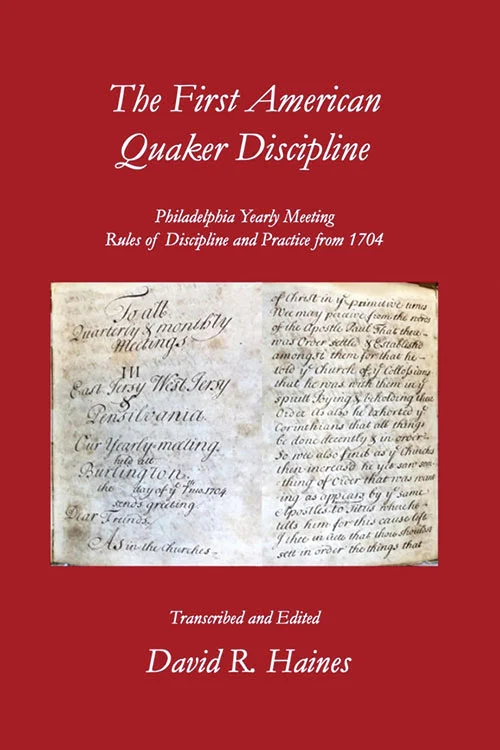
The First American Quaker Discipline: Philadelphia Yearly Meeting Rules of Discipline and Practice from 1704
Reviewed by Thomas D. Hamm
November 1, 2025
Transcribed and edited by David R. Haines. Pleasant Green Books, 2024. 80 pages. $16/paperback; $8/eBook.

“What Canst We Say?” The Evolution of the Quaker Book of Discipline: Philadelphia Yearly Meeting, 1715–1755
Transcribed and edited by David R. Haines. Pleasant Green Books, 2025. 176 pages. $20/paperback.
Friend David R. Haines is one of the leading collectors of Quaker books and manuscripts of the past half century. His day job before retirement was teaching organic chemistry at Wellesley College. His wife, Nancy Haines, came to share his enthusiasm and operated an antiquarian bookstore with an emphasis on used and rare Quaker materials. These two books, from the Haines’ own small publishing company, reflect David’s interest in Quaker history and are a model of both painstaking investigation and careful editing.
In the longer of these works, “What Canst We Say?” David Haines lays out a two-fold rationale that applies to both books:
The first purpose is to provide an easily accessible source of these texts which are fundamental to our understanding of the origins of the modern Society of Friends in America. Many of the issues included in the early Discipline continue to be of concern to us, while others may now be seen as anachronistic. The reality that we struggled with these issues (such as plain dress and language, the appropriate roles of women in the Society of Friends, and slavery) for so many years, has colored our own and society’s vision of who we are today.
It is essential to understand this, writes Haines, because “progress for a community is rarely linear and is often slow.” This leads him to his second justification. He wants to show not just the conclusions that Friends reached but how and why they reached them. For him “peripheral” issues are as revealing as those that we today find meaningful, for in them “we see all of the human foibles of modern human interactions”: avoidance, denigrating the messenger, false urgency. This history, he concludes, shows that “we have had to learn to have difficult conversations, to live with each other in times when we know that we are not yet in unity, and to make decisions as a community, even when we know that the decisions that we can make now are not the final solutions to the problems that we are seeking to address.”
A short review cannot do justice to the complexity of David Haines’s work. The shorter volume is a recreation of a work that has previously existed only in manuscript: the 1704 “General Testimony” issued by Philadelphia Yearly Meeting. Many Liberal Friends today will find its Biblicism and explicit Christianity unsettling. The longer work looks at how the Book of Discipline evolved between 1715 and 1755, focusing on the development of queries, the slow movement of the yearly meeting to ban slaveholding, and the roles of women in meetings for business.
This is not light reading, but it will gladden the hearts of Quaker history enthusiasts.
Thomas D. Hamm is a member of West Richmond (Ind.) Meeting and the clerk of the New Association of Friends. He is emeritus professor of history and Quaker scholar-in-residence at Earlham College.
1 thought on “The First American Quaker Discipline: Philadelphia Yearly Meeting Rules of Discipline and Practice from 1704”
Leave a Reply
Comments on Friendsjournal.org may be used in the Forum of the print magazine and may be edited for length and clarity.




Canst is used incorrectly here. It is an (archaic) second person singular form of can, here being used as first person plural..
It is unclear to me whether “what canst we say” is a quote from the original Book of Discipline or whether it is something the author is using to echo George Fox’s “what canst thou say”. In either case it is incorrect usage and should not be perpetuated. Just sayin’.